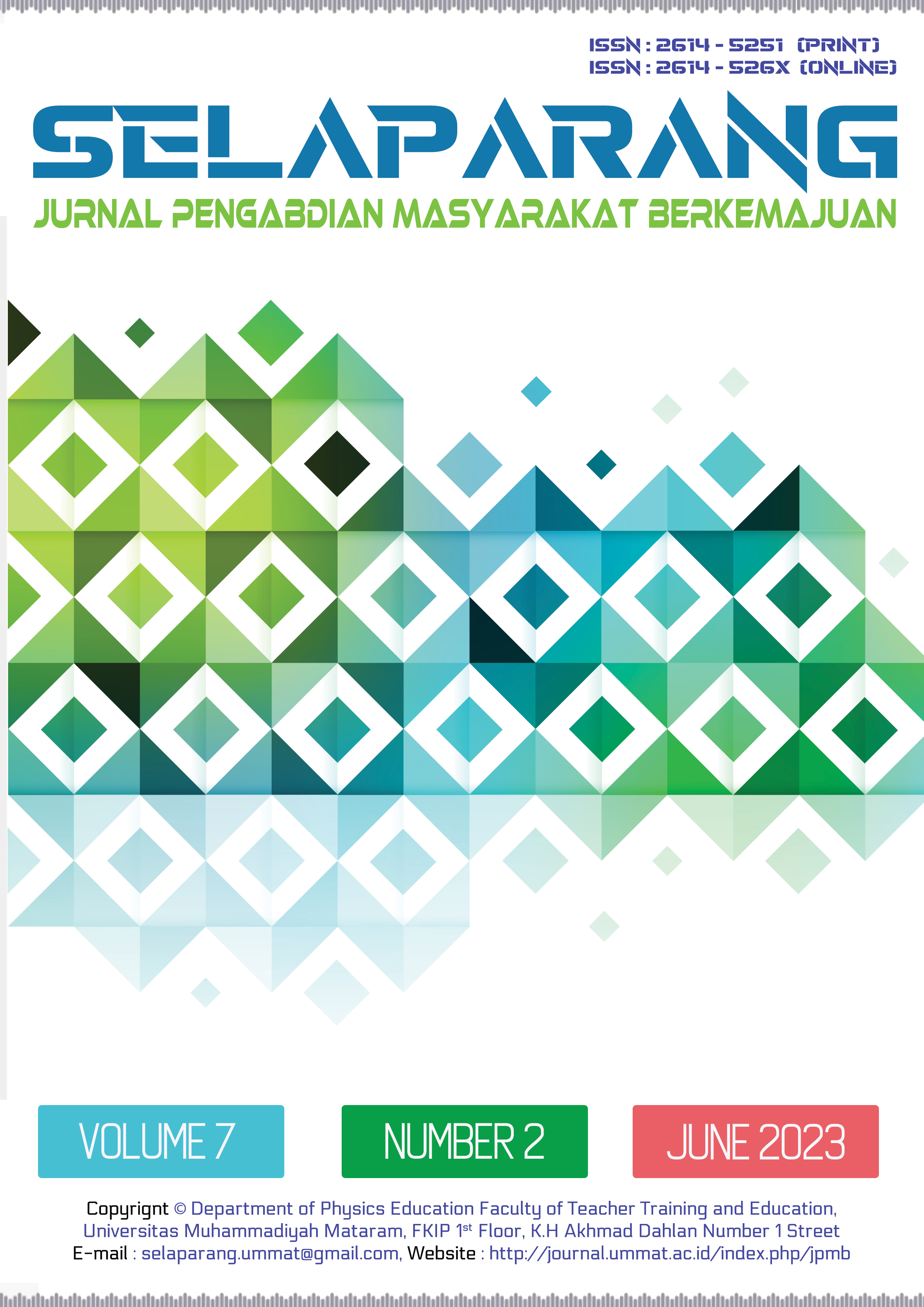EDUKASI KEJADIAN EFEK SAMPING OBAT PADA MASYARAKAT DI DUSUN MAPONG DESA JURANG JALER, LOMBOK TENGAH
DOI:
https://doi.org/10.31764/jpmb.v7i2.15511Keywords:
adverse drug reactions, education, mapong hamletAbstract
ABSTRAK
Efek samping obat atau Adverse Drug Reactions (ADRs) adalah efek obat yang tidak diinginkan yang terjadi selama penggunaan klinis pada dosis normal atau dosis terapi. Efek samping obat dapat berpengaruh pada kualitas hidup pasien, bahkan dapat menyebabkan morbiditas dan mortalitas. Rendahnya pemahaman dan kesadaran masyarakat mengenai obat yang aman, ditambah dengan banyaknya informasi kurang tepat yang beredar melalui media sosial merupakan tantangan baru bagi tenaga kefarmasian untuk melakukan edukasi kejadian efek samping obat yang diberikan kepada masyarakat. Tujuan kegiatan ini untuk memberikan edukasi kepada masyarakat tentang kejadian efek samping obat. Pelaksanaan pra kegiatan meliputi survei lokasi kegiatan di Dusun Mapong Desa Jurang Jaler, Lombok Tengah, proses pembuatan leaflet dan pencetakan leaflet. Pelaksanaan kegiatan dilakukan pada hari Rabu tanggal 29 Juni 2022 bertempat di Rumah Kepala Dusun. Leaflet yang telah disiapkan didistribusikan kepada peserta kegiatan. Pada tahap pasca kegiatan dilakukan evaluasi dilakukan dengan wawancara dan observasi secara lansung menunjukkan adannya peningkatan pengetahuan masyarakat tentang efek samping obat. Edukasi efek samping obat membuka wawasan masyarakat untuk lebih berhati-hati terhadap kemungkinan terjadinya efek samping obat, dan segera melaporkan kejadian efek samping obat kepada Tenaga Kesehatan atau fasilitas pelayanan Kesehatan terdekat untuk meminimalisir kejadian efek samping yang lebih berbahaya.
Â
Kata kunci: efek samping obat; edukasi; dusun mapong
Â
ABSTRACT
Adverse drug reactions (ADRs) are unwanted drug effects that occur during clinical use at normal or therapeutic doses. Drug side effects can affect the patient's quality of life, and can even cause morbidity and mortality. The low level of public understanding and awareness about safe drugs, coupled with a lot of inaccurate information circulating through social media, is a new challenge for pharmacy staff to educate the public on the incidence of adverse drug reactions. The purpose of this activity is to educate the public about the incidence of adverse drug reactions. The pre-activity implementation includes a survey of activity locations in Mapong Hamlet, Jurang Jaler Village, Central Lombok, the process of making leaflets and printing leaflets. The activity was carried out on Wednesday, June 29, 2022 at the Dusun Head's House. Leaflets that have been prepared are distributed to activity participants. At the post-activity stage,. The evaluation was conducted by interviews and direct observations showing an increase in public knowledge about drug side effects education.Education on adverse drug reactions opens the public's insight to be more careful about the possibility of adverse drug reactions, and immediately reports the occurrence of adverse drug reactions to Health Workers or the nearest health service facility to minimize the incidence of more dangerous adverse drug reactions.
Â
Keywords: adverse drug reactions; education; mapong hamlet
References
Goedecke, T., Morales, D. R., Pacurariu, A., & Kurz, X. (2018). Measuring the impact of medicines regulatory interventions–systematic review and methodological considerations. British Journal of Clinical Pharmacology, 84(3), 419–433.
Khan, L. M., Al-Harthi, S. E., Saadah, O. I., Al-Amoudi, A. B., Sulaiman, M. I., & Ibrahim, I. M. (2012). Impact of pharmacovigilance on adverse drug reactions reporting in hospitalized internal medicine patients at Saudi Arabian teaching hospital. Saudi Med J, 33(8), 863–868.
Kumar, A. (2012). Pharmacovigilance: Importance, concepts, and processes. American Journal of Health-System Pharmacy, 74(8), 606–612.
Santoro, A., Genov, G., Spooner, A., Raine, J., & Arlett, P. (2017). Promoting and protecting public health: how the European Union pharmacovigilance system works. Drug Safety, 40, 855–869.
Sholihah, I., & Santoso, J. (2021). Upaya Peningkatan Pengetahuan tentang Efek Samping Obat pada Warga Dasa Wisma dalam Upaya Penerapan Farmakovigilans. PaKMas: Jurnal Pengabdian Kepada Masyarakat, 1(2), 142–146.
Suku, C. K., Hill, G., Sabblah, G., Darko, M., Muthuri, G., Abwao, E., Pandit, J., Osakwe, A. I., Elagbaje, C., & Nyambayo, P. (2015). Experiences and lessons from implementing cohort event monitoring programmes for antimalarials in four African countries: results of a questionnaire-based survey. Drug Safety, 38, 1115–1126.
Yuwindry, I. (2020). PEMBERDAYAAN MASYARAKAT PESO (PINTAR EFEK SAMPING OBAT) DALAM UPAYA PENERAPAN FARMAKOVIGILANS DI MASYARAKAT DENGAN MENGGUNAKAN MEDIA VIDEO EDUKASI. Jurnal Pengabdian Farmasi Malahayati (JPFM), 3(2).
Downloads
Published
Issue
Section
License
The copyright of the received article shall be assigned to the journal as the publisher of the journal. The intended copyright includes the right to publish the article in various forms (including reprints). The journal maintains the publishing rights to the published articles.

Selaparang : Jurnal Pengabdian Masyarakat Berkemajuan is licensed under a Creative Commons Attribution-ShareAlike 4.0 International License.

